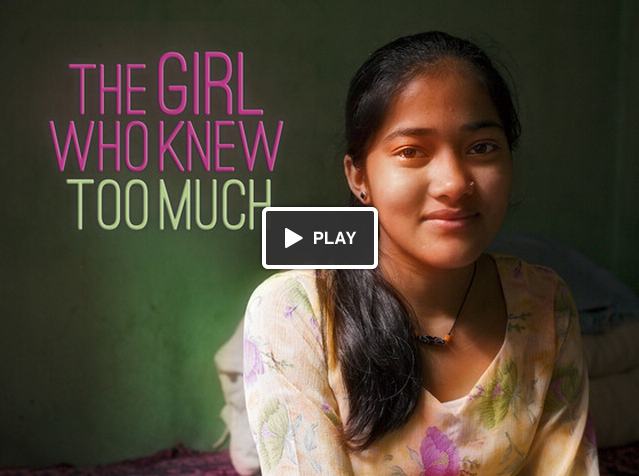Tonight, November 29, there’s going to be a “rough cut” screening, about 30 minutes long, of a new documentary film titled The Girl Who Knew Too Much (at Youngstown Cultural Arts Center in West Seattle, from 6 to 8 p.m.).
If you search on just the title, you might come up with an Italian horror-sexploitation film from the ’60s, which stands in stark contrast to this documentary about a Nepalese girl, an “untouchable,” who’d won a scholarship to high school. In the beginning, she was one of a few subjects the documentary was following, as it made its points that some 40 percent of Nepalese girls are married by 14 years of age, that 6 in 10 women struggle with illiteracy, while thousands end up being trafficked for sex.
But though the filmmakers, Seattle’s Scott Squire and Amy Benson, didn’t know it when they started work on what they thought would be an empowering film about educating girls, there would be death in their film, too. One of their star students would commit suicide a year before graduating. Stunned and questioning, they would learn that suicide is the leading cause of death among young Nepalese women. And they would watch as a suicide–as suicides do–irrevocably alter what everyone had thought the future would hold.
It’s heart-breaking to read, back in 2010, a blog post where Squire mentions Shanta:
In these 10 minutes we see her walking home from school, doing her homework, doing laundry and being pushed out of line while getting water, because of her “Untouchable” caste status. We get a big dose of how frustrating it is to live in a small space while trying to get ahead in school. There is also a hint at the enormous tension she has with her sister in law.
It ends with Shanta looking into the camera, and her voice over saying, “I am…hoping to become somebody.”
Shanta was hoping to become a doctor, in fact. She told Squire and Benson that she was in no hurry to marry. The new trailer features her sister-in-law suggesting that the lesson here is that it’s not good to be too smart, too independent. The screening tonight is in support of a Kickstarter drive to raise $27,000 to finish the film (more than $10,000 has been pledged so far, but they will need to reach that total to get any of it).
The filmmakers have by no means given up on education, but they are determined to tell the whole story, as they have witnessed it:
‘The Development Sector’ comprises about 70% of Nepal’s economy, and it is doing a lot of good. There is more access to healthcare, education and opportunity than ever before. Yet globalization has brought with it a complex array of social changes that has resulted in a gendered aspect. The negative impacts fall disproportionately upon poor women. Furthermore, the sharply increasing suicide rate has begun to garner some attention among human rights and global health care experts, but is not yet a major issue for development agendas.
